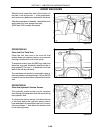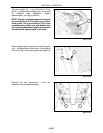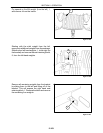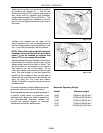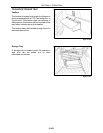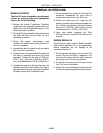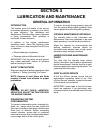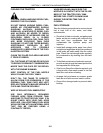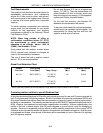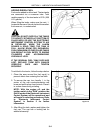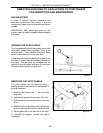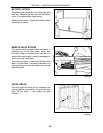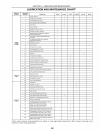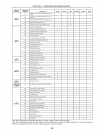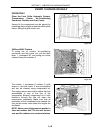
SECTION 3 - LUBRICATION AND MAINTENANCE
3-3
Fuel Requirements
The quality of fuel used is an important factor for
dependable performance and satisfactory
engine life. Fuels must be clean, well-refined,
and noncorrosive to fuel system parts. Be sure
to use fuel of a known quality from a reputable
supplier.
To obtain optimum combustion and minimum
engine wear, the fuel selected for use should
conform to the application and property
requirements outlined in the following “Diesel
Fuel Selection Chart.”
NOTE: When long periods of idling or
cold-weather conditions below 0°C(32°F)
are encountered or when continuously
operating at an altitude above 1,524 m
(5,000′), use Number 1-D fuel.
Using diesel fuel with sulphur content above
0.50% requires more frequent oil changes as
noted in the maintenance schedule.
The use of diesel fuel with a sulphur content
above 1.3% is not recommended.
Diesel Fuel Selection Chart
Do not use Number 2 -D fuel at temperatures
below -7°C(20°F). The cold temperatures will
cause Number 2-D fuel to thicken, which may
keep the engine from running. (If this happens,
contact your Buhler Versatile dealer.)
For the best fuel economy, use Number 2-D
whenever the temperature will permit.
To be sure a fuel meets the required properties,
enlist the aid of a reputable fuel oil supplier. The
responsibility for clean fuel lies with the fuel
supplier as well as the fuel user.
General
Fuel Class
Final Boiling
Point (Max.)
Temp. Range
Cetane
(Min.)
Sulphur Content
(Max.)
No. 1-D 288°C (550°F) -7°C(20°F)
and below
40
*
0.30%
No. 2-D 357°C (675°F) -7°C(20°F)
and above
40 0.50%
*When continually operating at low temperatures or high altitude, a minimum cetane of 45 is required.
Cummins position relative to use of Biodiesel fuel
At this time biodoesel blends up to B5 are the only blends approved for use in all Cummins engines for
both On Highway and Off highway markets. B5 which is a blend of 5 percent pure biodiesel (B100) and
95 percent standard petroleum diesel has demonstrated to have no impact on engine performance,
durability or maintenance. The industry standardk nown as ASTM D6751 defines the specifications for
B100. However, this standard currently lacks a specification for stability. Without a specification, the
quality of the fuel in blends higher than B5 could degrade to a point which c ould be damaging to
engines. Cummins is supporting industry efforts to add a stability specification to the current ASTM
standard, and continues to evaluate the impact of these blends on durability of engines. Until this spec
is developed and tested, other blends of biodiesel will be unsuitable for use in Cummins On highway
and Off highway engines.



